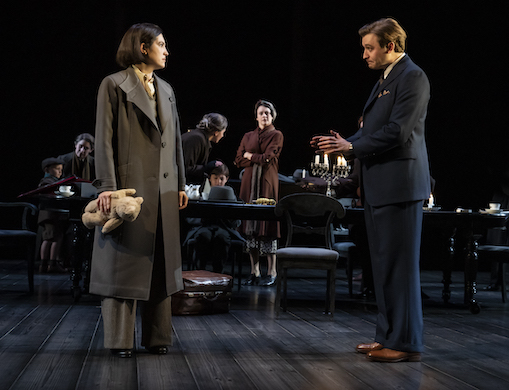With ‘Leopoldstadt,’ Stoppard Delves Into the Personal and the Universal
It wasn’t until the playwright was well into his 50s that he learned, through a cousin, how numerous relatives had been murdered under Hitler’s regime.

In more than five decades as one of the most celebrated playwrights on the planet, Sir Tom Stoppard has tackled subjects ranging from the Russian Revolution to thermodynamics to consciousness itself. The actor Daniel Cantor, a cast member in the Broadway production of his latest work, “Leopoldstadt,” recalls that while speaking at the 92nd Street Y recently, Sir Tom — he was knighted by Queen Elizabeth II in 1997 — “said that he doesn’t like to make his plays about himself.”
For “Leopoldstadt,” though, Sir Tom chose a topic that, as Mr. Cantor puts it, finds his “personal story intersecting with larger ideas and currents”: specifically, the persecution of European Jews that reached its devastating apotheosis with the Holocaust.
Arriving at New York after receiving acclaim during a London run — and the 2020 Olivier Award for Best New Play — “Leopoldstadt” follows a family based in Vienna’s Jewish quarter between 1899 and 1955. The characters, who represent four generations and are played by a company of more than two-dozen actors, with a number of them juggling different roles, include a boy who manages to escape Austria after his father dies and his mother marries an English journalist.
Sir Tom’s circumstances were similar: Born in 1937 to Jewish parents in Czechoslovakia, Tomáš Straüssler — his birth name — fled with his family to Singapore and later India, where his by-then-widowed mother met and later married a British army major, Kenneth Stoppard, and relocated to England with her two sons. It wasn’t until the playwright was well into his 50s that he learned, through a cousin, how numerous relatives had been murdered under Hitler’s regime.
“Leopoldstadt” addresses how many of Europe’s Jews assimilated and thrived even as the antisemitism that would empower the Nazis simmered just beneath the surface. For the production’s director, Patrick Marber — himself an accomplished playwright and screenwriter who had previously helmed a revival of Sir Tom’s “Travesties” — that undercurrent has lost none of its potency.
“There’s a brilliant book by a British writer, David Baddiel, called ‘Jews Don’t Count,’” Mr. Marber notes. “It points out how in the necessary world of identity politics, antisemitism is seen as a lesser crime than racism — when it is a form of racism, and it should be treated and deplored as such.”
Mr. Marber describes himself as “a God-fearing Jew who doesn’t believe in God. I’m a proud Jew, a cultural Jew; I said the Kaddish at my father’s funeral and I want to be buried like a Jew; I wouldn’t want my ashes scattered. But I haven’t willingly set foot in a synagogue in many years. One of the problems with being a Jew is that people ask, ‘What are you, then, if you don’t practice the religion?’ What is it that unites us? It’s a feeling, a knowledge, and that’s one of the things this play is about.”
The director sought to cast Jewish actors “in as many roles as I could, but not exclusively. There are non-Jews playing Jews, and there are Jews playing non-Jews.” Actor Seth Numrich, who is not Jewish, plays both the journalist based on Sir Tom’s stepfather and a young World War I veteran with a Jewish father and a Christian mother. During rehearsals, Mr. Numrich says, “There were conversations happening on many, many levels, with people sharing their experiences — how they grew up, what their family histories were, and their various connections to the many different ways into this play.”

Once Sir Tom began attending rehearsals, he took part in some of those conversations. “For the most part, Tom and Patrick have been the ones in direct communication, but there have been times where Tom has sought me out or I’ve run into him and we’ve talked,” Mr. Numrich says. “As is clear from his work, he’s a man of not only incredible intelligence but also curiosity — which I think is a signifier of intelligence. He’s interested in expressing ideas and in listening, and he has a lot of faith in us as actors, and I’m immensely grateful for that.”
For Mr. Cantor, who is the descendant of Viennese, Polish, and Lithuanian Jews — his grandparents escaped the Holocaust but “lost the majority of their relatives,” he notes — the message of “Leopoldstadt” has “a universality, with people having experienced brutality and oppression and even genocide all over the world. Investigating how this happens — How do human beings do this to one another? — that’s a question for all people.”
Mr. Marber also stresses that the play’s resonance transcends religious and historical specifics: “Sadly, it has become more and more relevant. When we started working on it three years ago, Russia hadn’t invaded Ukraine. Now Europe is in turmoil again. And immigration, asylum-seeking, all these issues we’re facing now, they’re all in the play.”
While listening to a recent news report, in fact, Mr. Numrich was reminded of an exchange between the journalist he plays and his Jewish fiancée. “I was listening to the BBC, and a reporter was speaking to a woman in Ukraine. The reporter was saying, ‘Why are you still here? Don’t you understand what’s happening? You’re in great danger; your children are in danger.’ And the woman was saying, ‘Who are you? You don’t live here. This is our home; this is everything to us.’”
The interview, Mr. Numrich says, “sent chills down my spine, because it’s the same conversation happening again. The echoes of those questions and those fears are very clear, and I’m very glad that Tom has so beautifully given voice to all sides of these complicated realities.”

